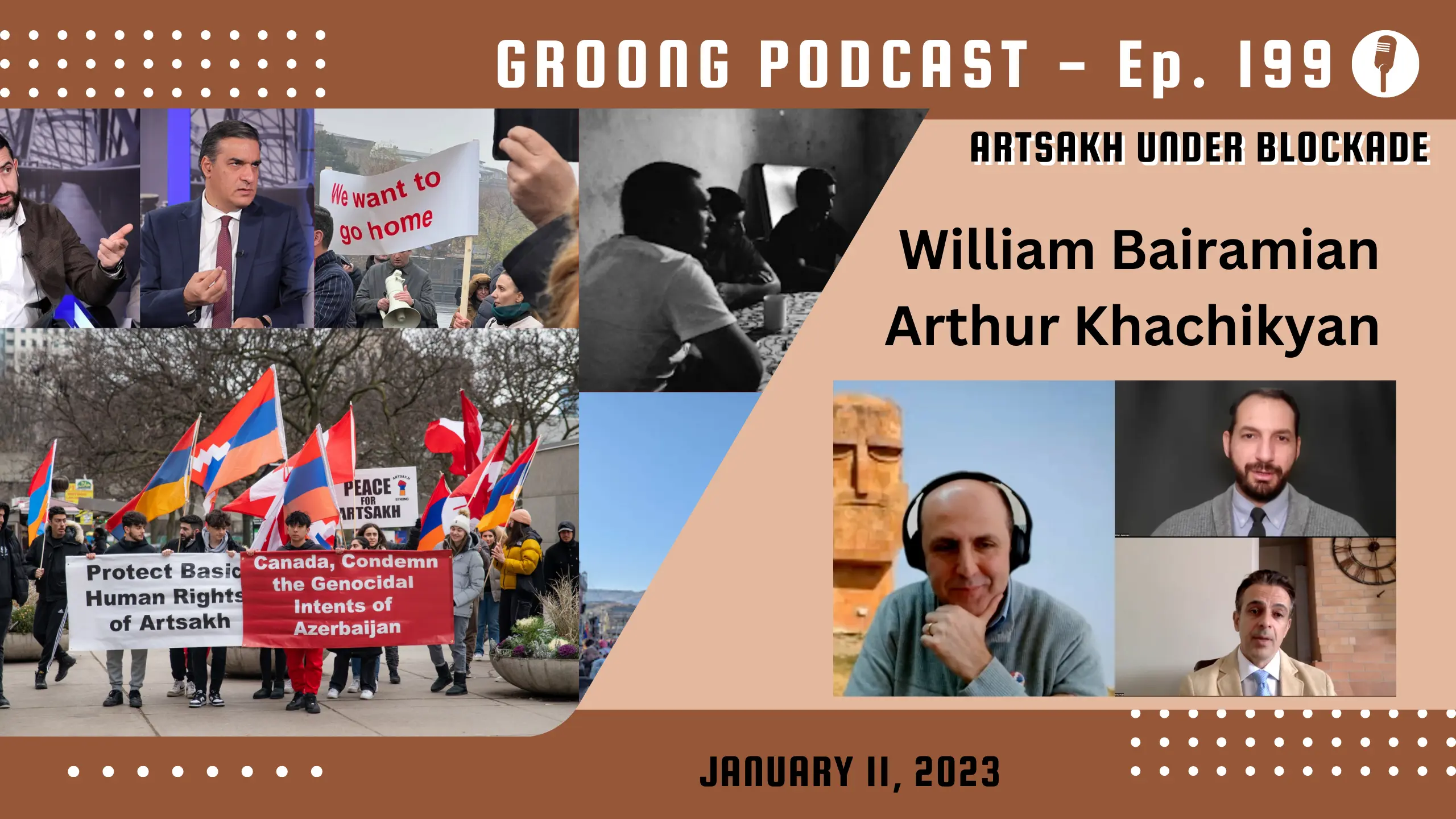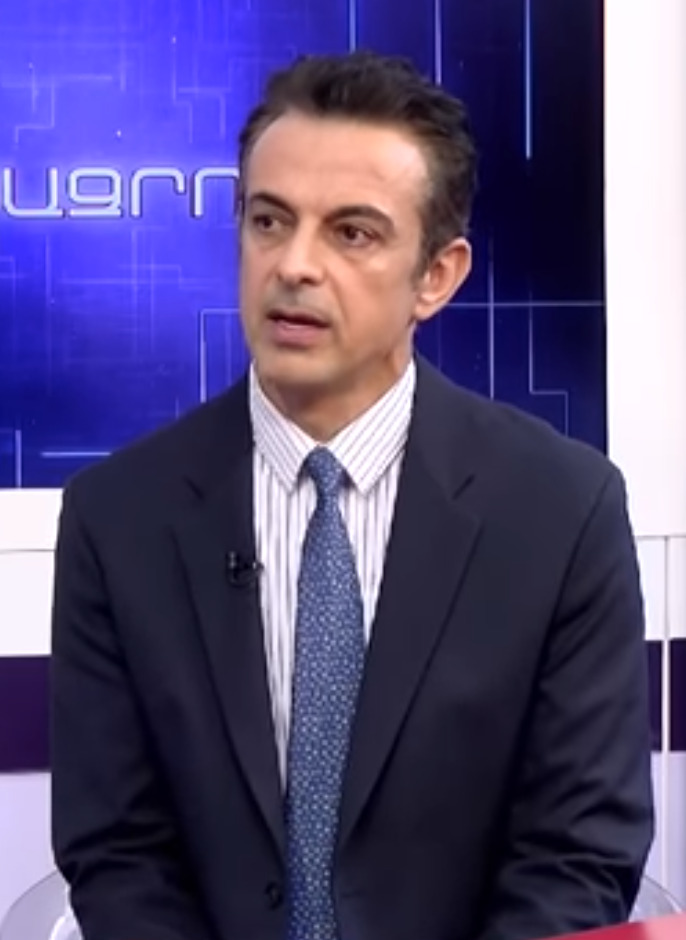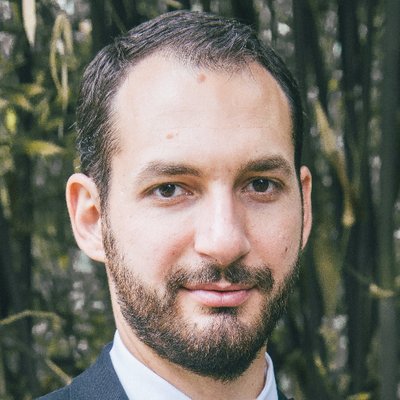
Guests:
- William Bairamian, founder and editor of The Armenite. He has written extensively on Armenian politics, culture, and society. He received degrees in international affairs from Columbia University and UCLA.
- Arthur Khachikyan, International Relations expert from Stanford University, specializing in Intervention. He currently teaches at the Russian Armenian University in Yerevan.
“This is a repeat of Srebrenica. To gradually strangle and force the people to leave.” -Arthur Khachikyan
Topic:
More than 120,000 people remain trapped in the Republic of Artsakh (or Nagorno-Karabakh) due to Azerbaijan’s blockade of the Lachin (Berdzor) corridor, as this crisis enters its 31st day.
This interview is a continuation of the collaboration between Groong and 168 Hours aiming to bring you more English-language coverage on the developments of this very serious humanitarian crisis in progress.
Links:
- 168 Hours: https://168.am
- Groong: https://podcasts.groong.org
Episode 199 | Recorded: January 11, 2023
Show Notes
Discussion
The dire situation in Artsakh and Armenia is developing at ever increasing speed.
Yesterday, in addition to the political crisis in Artsakh, Nikol Pashinyan held a press conference where he essentially put it in the plainest terms that Armenia’s security partnership with Russia and CSTO is not welcome for his regime. And despite the blockade of Artsakh and daily threats of violence by Aliyev, his government is interested in signing a treaty, one that he calls “a peace treaty” but which we call a capitulation.
1. What is Pashinyan’s endgame?
At times, Pashinyan and his team’s behavior has been very haphazard. One day they criticize the Russians on another day they suck up to Putin and say that Armenia is Russia’s greatest ally.
But yesterday’s speech leaves no room for doubt.
**** Reactions
BACKGROUND INFO, WHICH CAN BE MENTIONED:
Pashinyan’s 4-hour press conference:
- Russian military-base in Armenia is not a guarantee of Armenia’s security but places that security under threat because of Russia’s unwillingness to act to defend its ally.
- Aliyev is scared of signing a peace treaty with Armenia because he fears that after signing Armenia may start new processes to threaten Azerbaijan’s statehood.
- CSTO exercises in Armenia could be perceived as a threat to Turkey / Azerbaijan.
2. Apparent inaction in Diaspora and Armenia
Over the last two years, the Armenian nation has seen a continuum of tragic events, one after another.
During the 44 day war, both in Armenia and Diaspora we witnessed what national mobilization could look like. From protests in front of the CNN office to wide scale volunteering for the battlefield.
However, this changed after Nov 10. In Armenia, there’s a very vocal resistance movement that has been critical of the Pashinyan regime, and was not able to achieve their stated goal of removing Pashinyan. The movement has died down as the opposition’s legitimacy has tanked. The majority of people however are on the sidelines.
In the Diaspora, among politically invested circles there are also great divisions, as exemplified by the split in the ARF. But a majority of the diasporans too don’t seem to be keen on expressing an opinion on political matters.
And it seems that even issues such as the blockade of Artsakh or even Pashinyan’s speech yesterday don’t seem to be generating reactions, one way or another.
Questions:
- William, you live in the diaspora. I believe you’ve also thought about these questions in detail over the past few years. What is your take on this? Is this a real problem or an issue of perception? What is it exactly? Apathy? Sublimated anger? And if it is a problem, is it measurable?
- What are the causes for this apparent low engagement? Has the war in Ukraine affected this in any way?
- The traditional notion is that when there is unity among Armenians (both diaspora and motherland) then we are successful. If achieving unity and increasing support is critical, how do we achieve it?
3. Foreign Funding of Media
William, you’ve documented the work of foreign-funded NGOs in Armenia for The Armenite.
I was reminded of this problem when in a Facebook group that I’m a member of, someone asked for recommendations of news sources in Armenia. One member recommended Azatutyun (which we all know to be funded by the US State Department) while another member recommended a different news outlet which was alleged to be influenced by Russia.
- Can you tell us what motivated you to do this work?
- Is it really a problem? If so, how big?
- How big was the influence of foreign media in bringing Nikol Pashinyan to power.
- So what if Azatutyun is US funded? Don’t they have governance policies that force them to be objective, balanced, etc…?
- How about Sputnik and other Russian media? Should they also get similar treatment?
The US has FARA which requires certain foreign funded media to register as foreign agents, but interestingly it is selectively enforced. For example, Russian media such as Sputnik were only required to register under FARA recently.
- Is the problem primarily or exclusively a legislative one? Would FARA-like legislation work in Armenia?
4. The Coming “New World Order”
With the war in Ukraine, many are predicting a schism between Russia and the Western world. Others are pointing to a multipolar world, with regional actors playing bigger roles.
Questions:
- How real are predictions of a multipolar world? How much of this is dependent on the outcome of what happens in Ukraine?
- If so, what will this new world look like?
- Is “complementarism”, Armenia’s previous foreign policy of trying to appease both the West and Russia, dead?
Wrap-up
We hope you found our Conversations on Groong helpful, we invite your feedback and your suggestions. You can find us on most social media and podcast platforms. Thanks to Laura Osborn for the music on our podcasts.
Guests

Arthur Khachikyan
Dr. Arthur Khachikyan, an International Relations expert from Stanford University, specializing in intervention. He currently teaches at the Russian Armenian University in Yerevan.

William Bairamian
William Bairamian is the founder and editor of The Armenite. He has written extensively on Armenian politics, culture, and society. He received degrees in international affairs from Columbia University and UCLA.
Hosts

Hovik Manucharyan
Hovik Manucharyan is an information security engineer who moved from Seattle to Armenia in 2022. He co-founded the ANN/Groong podcast in 2020 and has been a contributor to Groong News since the late 1990s.
Disclaimer: The views expressed by Hovik Manucharyan on the ANN/Groong podcast are his own and do not necessarily reflect the opinions of his employer or any other organization.